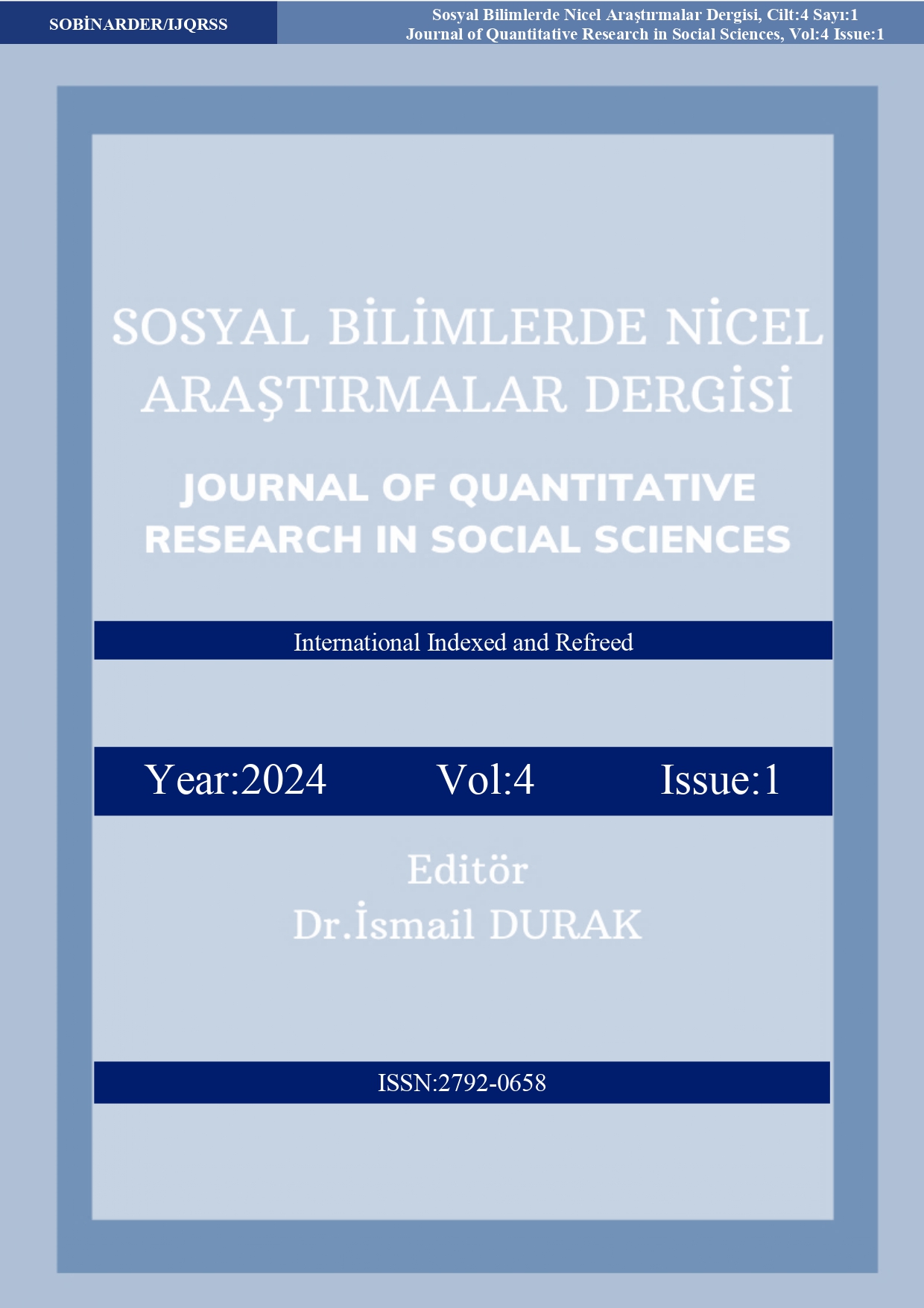Investigation of Ethnocentric Trends in Food Consumption in Terms of Demographic Variables
Gıda Tüketiminde Etnosentrik Eğilimlerin Demografik Değişkenler Bakımından İncelenmesi
Keywords:
Ethnocentrism, Consumer Ethnocentrism, Purchasing Behavior, Food ProductsAbstract
This study was conducted to investigate the variability of ethnocentric tendencies in terms of demographic factors in food product purchases of consumers living in Sivas province. Consumer ethnocentrism was measured using the CETSCALE developed by Shimp and Sharma (1987), which evaluates individuals' tendencies to prefer domestic products. The variability of consumer ethnocentrism according to demographic factors such as gender, age, education level, marital status, employment status, working sector and income level was examined. The Turkish version of the CETSCALE was applied as a survey form to 514 participants selected through convenience sampling and voluntary participation among consumers residing in Sivas. The survey was used as a 7-point Likert type in accordance with the original. Data were collected face to face and online, and the data obtained was analyzed in IBM SPSS 23.0 program. The findings revealed that consumers' ethnocentrism tendencies differ significantly according to age, education level and working status. There was no significant difference in terms of gender, marital status, sector of employment and income level. This study constitutes an important resource for businesses operating in the food industry in understanding consumer ethnocentrism and developing effective marketing strategies accordingly.
References
Alam, M. A., Roy, D., Akther, R. & Hoque, R., (2022). “Consumer Ethnocentrism And Buying Intentions On Electronic Products: Moderating Effects Of Demographics”, South Asian Journal of Marketing, 3(2), 82-96.
Bülbül, E. S. (2000). “Çoklu Karşılaştırma Testleri ve Bir Örnek Uygulama”, Öneri Dergisi, 3(14) :95-100. https://doi.org/10.14783/maruoneri.734123
Demir, E.,(2018). “Tüketici Enosentirzmi: Türkiye ve İsveç Karşılaştırması”, Akademik Araştırmalar ve Çalışmalar Dergisi, 10(8), 120-133.
Durvasula, S., Andrews, J.C. & Netemeyer, R. G. (1997). “A Cross-Cultural Comparision Of Consumer Ethnocentrism in the United States And Russia”, Journal of International Consumer Marketing, 9/4, 73-93.
Elibol, A. (2013). Tüketici Etnosentrizminin Satın Alma Davranışı Üzerindeki Etkisi. Yüksek Lisans Tezi. Süleyman Demirel Üniversitesi Sosyal Bilimler Enstitüsü İşletme Anabilim Dalı.
Elibol, A. (2020). “ Tüketici Satın Alma Kararlarında Tüketici Etnosentrizmi ve Sosyo-Psikolojik Faktörlerin Etkisi”. Bucak İşletme Fakültesi Dergisi. 3(1): 92-130.
Good, L.K. & Huddleston, P. (1995). “Ethnocentrism of Polish and Russian Consumers: Are Feelings and Intentions Related?”. International Marketing Review, 12/5, 35- 48.
Gökçe, A. (2019). Tüketici Etnosentrizmi ve Döviz Yatırım Tercihleri, Balıkesir Üniversitesi Sosyal Bilimler Enstitüsü İşletme Anabilim Dalı, Balıkesir.
Gürbüz, R. B. & Bardakçı, S. (2023). Tüketici Etnosentrizmi Ölçeğinin (CETSCALE) Faktör Yapısının Gıda Tüketimi Bağlamında İncelenmesi. Kuram Ve Uygulamada Sosyal Bilimler Dergisi, 7(2), 252-266. https://doi.org/10.48066/kusob.1383698.
Ha, C. L. (1998). The Influence of Consumer Ethnocentrism and Product Characteristics on Country of Origin Effects: A Comparison Between U.S. Consumers and Korean Consumers, , Faculty of the Graduate School of the University of Texas, Doktora Tezi, Arlington.
Kaynak, E. & Kara, A. (2002). “Omani Consumer’s Ethnocentrism and Demand for Locally Produced Products”, American Journal of Industrial and Business Management, 8(6), 928-949.
Kurnaz, A. (2021). Etnosentrizm İle İlgili Çalışmaların Bibliyometrik Analizi. Beykoz Akademi Dergisi, 9 (2), 98-118. https://doi.org/10.14514//BYK.m.26515393.2021.9/2.98-118
Myrvang, N. A., Sancak, R. E & Mete, M. (2021). “ Etnosentrik Eğilimin Hasta-Hekim Yönelimine Etkisi: İstanbul İli Örneği”, International Journal of Applied Economic and Finance Studies, 6(2), 89-104.
Özçelik, D. & Torlak, Ö. (2011). “Marka Kişiliği Algısı ile Etnosentrik Eğilimler Arasındaki İlişki: LEVIS ve MAVİ JEANS Üzerine Bir Uygulama”. Ege Akademik Bakış, 361-377.
Özdemir, E. K., Güzeloğlu, E. B. & Topsümer, F. (2018). “Tüketici Etnosentrizmi, Marka Kişiliği Algısı ve Satın Alma Niyeti Arasındaki İlişkinin Değerlendirilmesi: Türkiye’deki Beyaz Eşya Markalarına Yönelik Bir Uygulama”, Global Media Journal TR Edition, 8(16). 354-372.
Öztürk, Y. (2020). “Tüketici Etnosentrizminin Turistik Satın Alma Tercihine Etkisi”. İşletme Araştırmaları Dergisi, 12 (1), 304-313.
Sharma, S., Shimp, T. A., & Shin, J. (1995). “Consumer Ethnocentrism: A Test of Antecedents and Moderators. Journal of the Academy of Marketing Science”, 23(1), 26-37.
Sheikhepoor, Z., Moshabaki, A., Khodadad Hosseini, S. H. & Mansouri Moayad, İ, F. (2020). “Designation The Model of Consumer Willingness to Buy Domestic Products Given The Role of Consumer Consciousness in Iranian Beverage Industry”. Consumer Behavior Studies Journal, 7(1), 105-129.
Shimp, T. A., & Sharma, S. (1987). “Consumer Ethnocentrism: Construction and Validation of the CETSCALE”, Journal of Marketing Research, 24(3), 280-289.
Sumner, W. G. (1906). Folkways: A Study of the Sociological Importance of Usages, Manners, Customs, Mores, and Morals. New York: Ginn and Co.
Yılmaz, A., Ulaş, M. & Yeşil, A., (2022). “Etnosentrizm ve Tüketici İlişkiselliği: Yerli Otomobil Satın Alma Niyetinin Öngörüsü”, Selçuk İletişim Dergisi, 15(11), 110-141.
Yu, J., & Albaum, G. (2002). “Sovereignty change influences on consumer ethnocentrism and product preferences: Hong Kong revisited one year later”, Journal of Business Research, 891-899.
Yurtsızoğlu, Z. & Gül, O. (2021). “Spor Takımı Taraftarının Etnosentrik Tüketim Eğilimi”, Yönetim Bilimleri Dergisi, 20/45, 589-612.
Downloads
Published
How to Cite
Issue
Section
License
Copyright (c) 2024 Journal of Quantitative Research in Social Sciences

This work is licensed under a Creative Commons Attribution-NonCommercial 4.0 International License.
Telif hakkı hakkında










